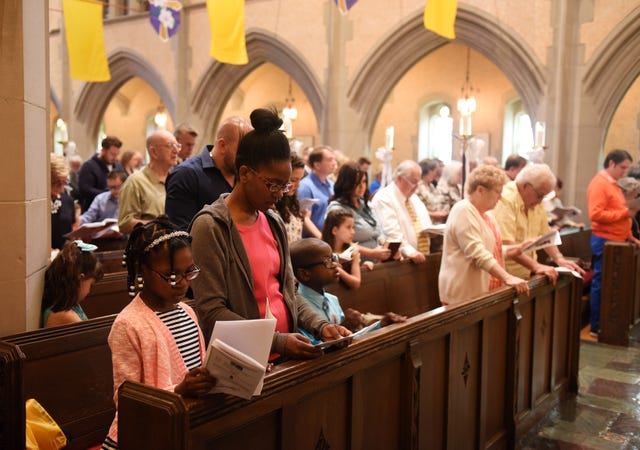
The physical, spiritual, and emotional rush of Holy Week is behind us now. It remains for me the best week of the year, every year, and having the privilege of serving a congregational vacancy afforded me one more time the absolute delight of direct participation in the delivery of the story and the promises to the congregation. There are few things better about serving in The Office, than being the first to declare “Alleluia, Christ is Risen!” to his gathered people.
But observing Easter in the chancel also brings with it those uncomfortable moments when in spite of announcements verbal and printed, mysterious people appear at the altar, who after looking for guidance from the actions of those around them, gingerly and curiously extend a hand toward the pastor bearing the paten.
I’ll resist the easy opportunity to reinforce previous teaching regarding closed communion, and instead make another application from this scenario. In fact, I’ll put the best construction on things, and assume that the awkward communicant was just having a temporary lapse and was indeed a “member in good standing of the LCMS or one of her sister church bodies.” Actually, that’s not a far-fetched conclusion since the odds of unconnected people wandering into the nave for an Easter worship service are poor indeed. “Christers” are no longer people from the neighborhood who show up for church twice a year; in the age of the “nones,” nominal Christians don’t bother themselves with a semi-annual trek to the sanctuary. No, now those with the spotty attendance have their name on a list somewhere but their attendance is nevertheless not a habit but a decided effort.
While presumably few pastors would be satisfied with such superficial commitment from their members, how much do we actually invest to address the problem? And I certainly don’t mean to suggest that we need a new initiative or program to reach our marginal members or those leaning against the church’s back door. Good pastoral care tells you what to do for your wandering sheep. The bigger point, I think, is for us to consider carefully and honestly the message we are conveying to all who come to worship on any given Sunday about what it means to be part of the Body of Christ we call the church. If we are overjoyed merely that people appear, perhaps we are miscommunicating the truth about following Christ. If we are content with a level of Christianity that peaks at regular church attendance but never gets around to Bible class and faithful giving, much less actually striving consciously to follow Christ, honor the Father, and live for the sake of the other 24/7 what are we saying about what it means to be church, and perhaps more pointedly are we being faithful to our call? Jesus was rather explicit about the task. We are to make disciples and teach them “to observe all that I have commanded you?” That means a lot more than church attendance a handful of times a year, and even a lot more than attendance every week.
The best remedy for a lackluster attitude toward church membership is a church that expects all of her sheep to follow Christ in all of life. A church demonstrates that by the deliberate way it goes about forming all of her members into a life of discipleship evident in catechesis, sermons, and yes, potlucks among other things. Most importantly, all of this begins with the thinking and purpose driving the pastor – which accounts for my writing all of this here. Never settle for anything less from your sheep than Jesus himself expects from them; and never take for granted the enormous privilege of delivering Jesus’ gospel to your sheep when they fall short.
Joel Biermann



Leave a Reply
You must be logged in to post a comment.